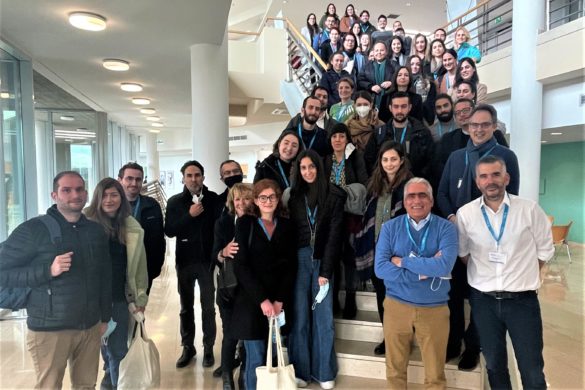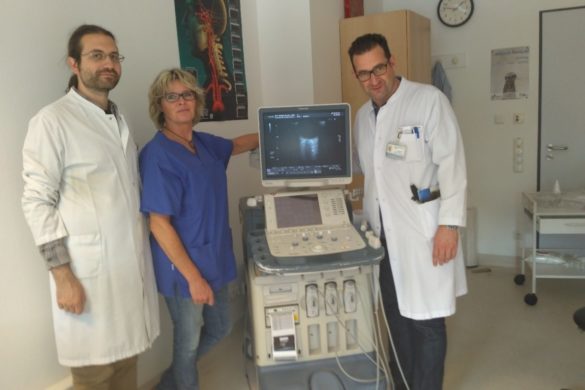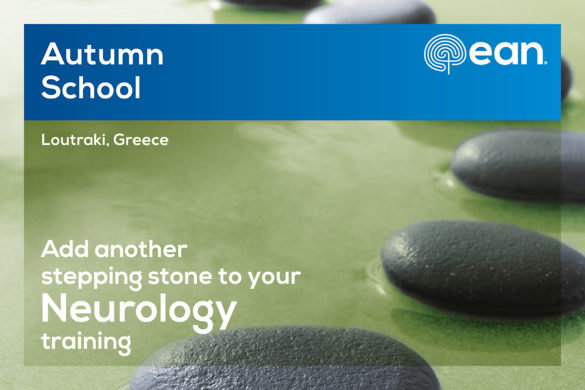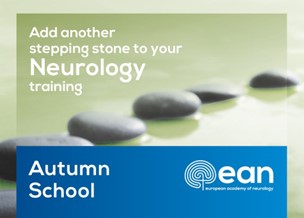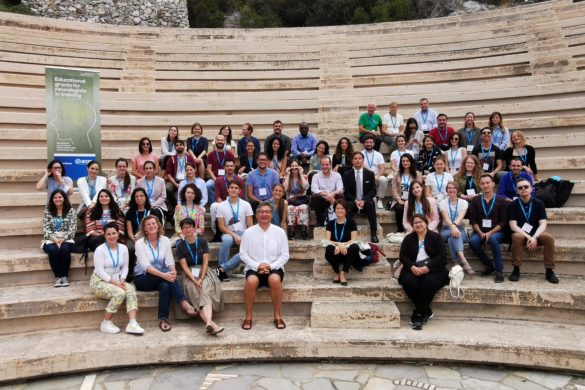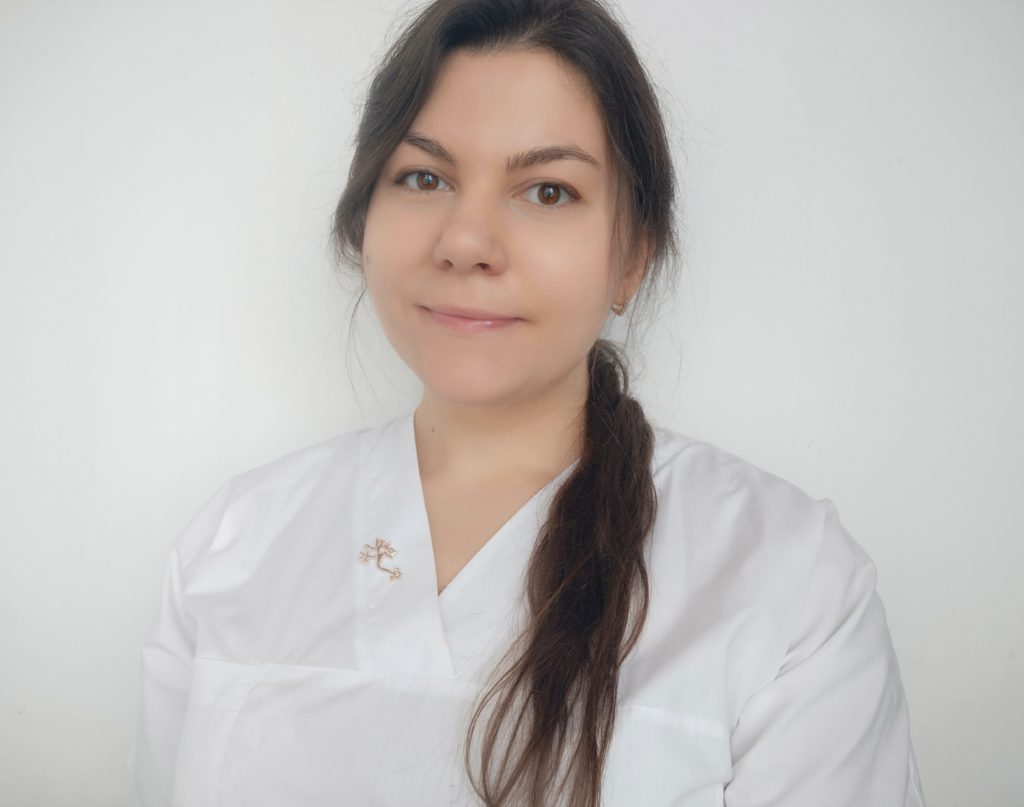
Alina Ivaniuk, Odessa, Ukraine
Term of the Fellowship: 21.7. – 26.8.2021
Hosting department: Department of Neurology, Medical University Innsbruck, Innsbruck, Austria
Supervisor: Prof. Dr. Michael Knoflach
Before starting to describe my experience, I would like to thank the European Academy of Neurology for granting me an opportunity to train at one of the leading university clinics in Austria, the Neurological Clinic of the University Hospital Innsbruck. Although due to COVID-19-related issues my fellowship lasted a bit less than the standard EAN Fellowship—five and half weeks instead of six—it was an exceptional educational adventure, full of new clinical experiences and richly seasoned with the flavor of the Tyrolean culture.
The Neurological Clinic consists of seven inpatient departments, including the Epilepsy Monitoring station, Stroke Unit, and Neuro ICU, and out-patient departments and neurological laboratories. During my stay, I rotated between three in-patient departments and visited outpatient clinics for epilepsy, multiple sclerosis, and movement disorders. I spent two weeks at the mixed department, one and a half weeks at the Stroke Unit, and two weeks at the Epilepsy Monitoring Unit and was involved in clinical rounds and daily activities based on the department. Additionally, I visited Neuro ICU and was able to attend neurosurgical OR to observe operations held with intraoperative neuromonitoring. It was interesting to observe differences not only in the management of the patients per se but also in the organisation of care, interactions between the healthcare providers, and available diagnostic and therapeutic arsenal. In terms of skills, after my internship I feel much more confident in performing and interpreting EEG, intraoperative neurophysiology, and neurosonology.
Every day started with the morning conference, at which new admissions to all the departments were reported. A radiologist was present every time along the way to comment on the pertinent findings. On certain days, specialised conferences for vascular disorders, epilepsy, and neuro-oncology were held. At these, neurologists, neurosurgeons, neuroradiologists, and—if needed—oncologists gather to dissect complex cases.
The reception by the host staff was welcoming. My requests to attend a certain clinic, operation, or procedure never got rejected. Although physicians are fluent in English, all the clinical encounters are held in German, so a working knowledge of German is essential for anyone who would like to visit the Clinic for training. The local language has some particular features and initially, I did have some problems communicating with people who spoke the Tyrolean dialect, but physicians readily explained to me what was going on in high German. Hence, I had a unique opportunity not only to wrap my head around complex neurological issues but also to enrich my German with some words and sayings from the local dialect.
My warmest gratitude goes to all the staff members of the Neurological Clinic for their help, endless patience, and guidance. I would like to especially thank Prof. Dr. Knoflach, who gave the green light for the whole of my Innsbruck adventure and supported me with all means throughout my stay at the clinic, and Dr. Hainberger-Viktora, who invested a great amount of her time in teaching me EEG interpretation tricks and granted me warm friendly talks which gave me a lot of insight into the life of the department and life in Tyrol overall. Last, but not least, I would like to say a very special Danke schön to Prof. Dr. Unterberger. Although to my deepest regret, I got to know her for a very short time, which beholders could judge to be a rather superficial encounter, this acquaintance left a deep print in my mind: her springing energy pulled back my anxiety of the first days, gave me a priceless feeling of being home, and charged me with a special aptitude for the rest of my stay.
I will truly cherish every moment I spent in Innsbruck and do my best to apply the acquired knowledge at my home department. Though saying Auf Wiederschauen to Innsbruck for now, I doubt it will be the final parting and hold a warm hope for further encounters at conferences and training events.
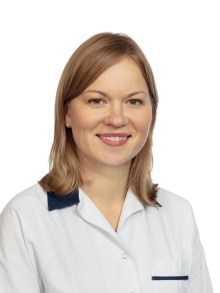
Elina Pucite, Riga, Latvia
Term of the Fellowship: 19.4. – 1.7.2021
Hosting department: Epilepsy Monitoring Unit, Neuromed Campus, Kepler Universitaetsklinikum, Linz, Austria
Supervisor: Prim.Priv.-Doz.Dr.Tim J.von Oertzen
My EAN Clinical Fellowship took place at the Epilepsy Monitoring Unit at Neuromed Campus, Kepler Universitätsklinikum in Linz, Austria under the supervision of Prim. Priv.-Doz. Dr. Tim J. von Oertzen and his team.
The main aim of my Clinical Fellowship was to gain knowledge in diagnosis and treatment of different epilepsy syndromes and to get experience particularly in performing and analysing long-term video EEG monitoring.
On the first day I was introduced to the team led by Dr. von Oertzen: Dr. Gabriele Schwarz, Dr. Anna Maria Hengsberger, Priv.-Doz. Dr. Gudrun Gröppel, Dr. Rainer Dormann and the EEG technicians. From then on, I was involved in all clinical activities at Neuromed Campus:
- I attended adult and children’s outpatient departments. There I had the opportunity to see and learn about the organisation and structure of visits, the approach to patients and how patients with different epilepsy syndromes should be managed in the outpatient setting.
- I participated in all regular visits or rounds on the ward with all EMU physicians where each specific patient was re-evaluated and discussed to choose the best further management. During these valuable discussions where all physician shared their opinions, theoretical, practical knowledge and experience, I learned the most.
- I had the chance to interpret outpatient EEG with junior physicians, which were discussed with Dr. Schwarz or Dr. Hengsberger afterwards, and was able to ask any questions about standard EEG to improve my EEG reading skills. Besides the analysis of standard EEG, I spent the most time on analysis of long-term video EEG: reading EEG and interpreting seizure semiology which were discussed with senior physicians afterwards.
- Each week there was the Epilepsy Board meeting where complicated and unclear cases were discussed, regarding which surgical or neuromodulatory or additional sophisticated diagnostic method should be conducted. During these comprehensive meetings I learned the importance of careful analysis of additional diagnostic tools such as PET, ictal SPECT, and full report of neuropsychological assessment. In more unclear cases – the approach of the planning for implantation of depth electrodes with subsequent analysis of stereo-EEG and possibilities to perform and conduct resective surgery.
- I had the opportunity to see different diagnostic invasive manipulations (Wada test) as well as sophisticated surgical approaches such as VNS implantation, intraoperative corticography and intraoperative brain mapping. Additionally, the functional status of two patients after corpus callosotomy.
Therefore, I am very grateful for the opportunity to take part in an EAN Clinical Fellowship because all my aims were accomplished, and I learned and gained new knowledge and practical skills even more than I expected.
I am really appreciative to Dr. G. Schwarz, Dr. A.M. Hengsberger, Priv.-Doz. G. Gröppel and Dr. R. Dormann for their obliging sincerity and will to share their valuable time, knowledge and experience.





